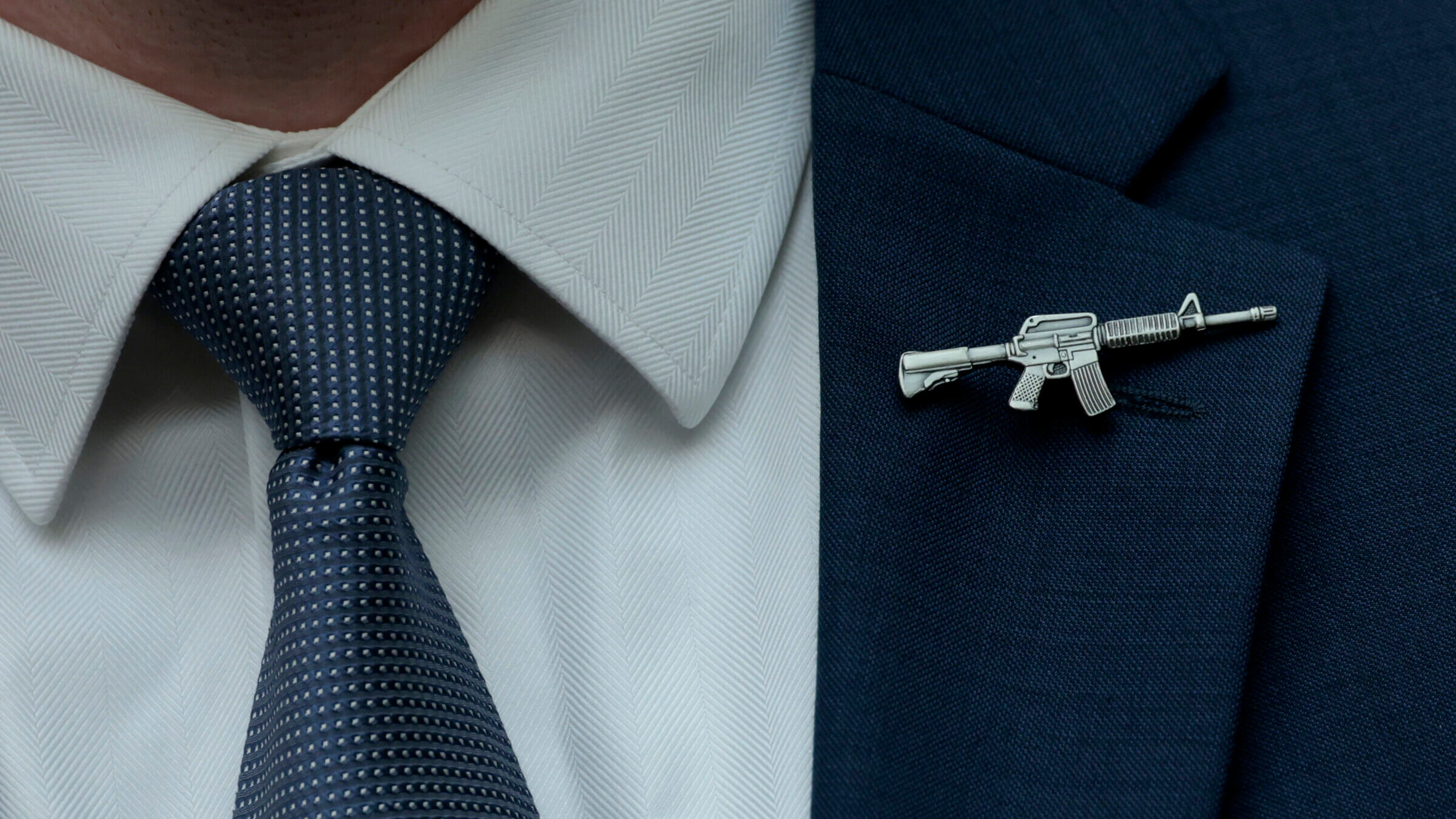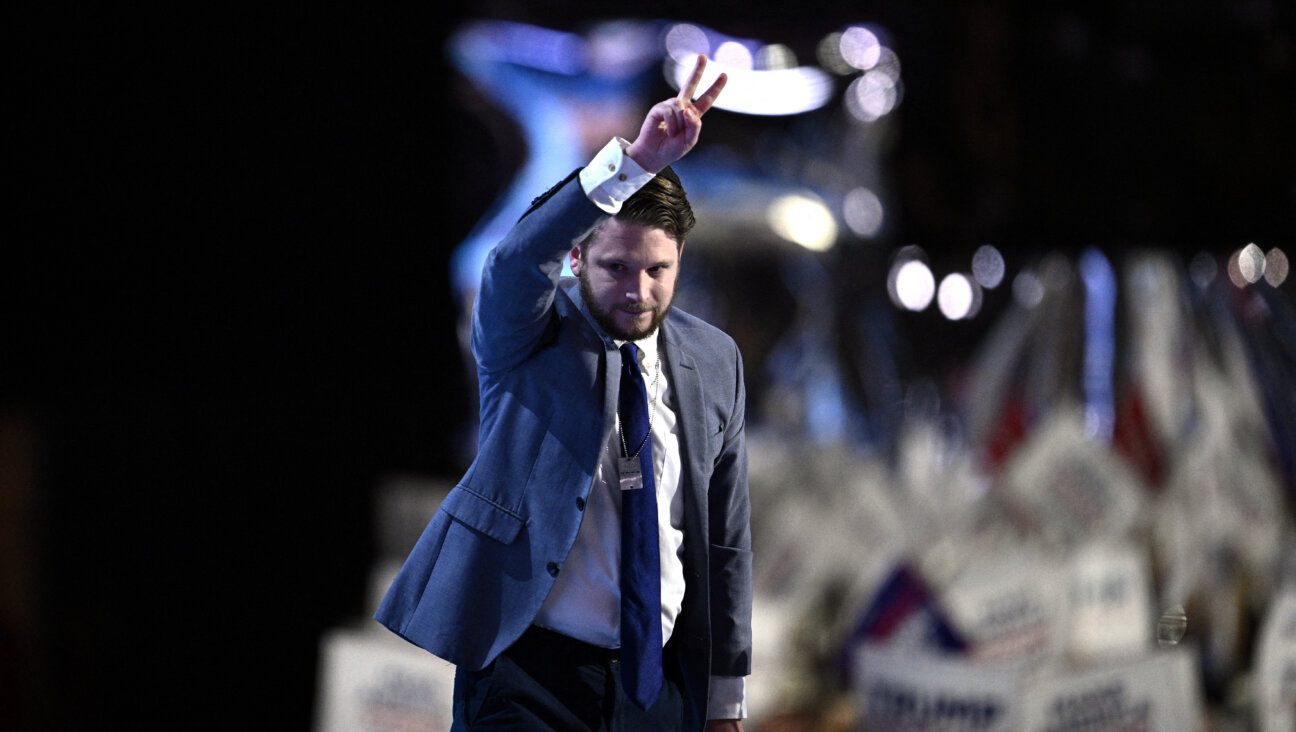My fellow Orthodox rabbis need to take a stronger stance against guns
Our emergency plans will only go so far to save lives. What would really make a difference is immediately reducing the number of guns in our country.

A congressional staffer wears a rifle-shaped pin on his suit during a House Judiciary Committee markup hearing in the Rayburn House Office Building on June 2, 2022, in Washington, D.C. Photo by Anna Moneymaker/Getty Images
Orthodox rabbis have got to take a stronger stand against the leading cause of death of children in this country: guns.
While other Jewish groups take strong stances on gun control, the response of the Orthodox community to the epidemic of mass shootings has been lacking in force and substance.
The day after the Uvalde, Texas, massacre that left 21 people dead, the Rabbinical Council of America, the leading membership organization of Orthodox rabbis in North America, called for “meaningful dialogue” and “substantive actions” to curb gun violence.
The RCA did not specify who should engage in dialogue, and it was unclear what “substantive actions” they had in mind — a tepid response that shows waning support for gun control.
It wasn’t always this way. In 1968, Orthodox leaders joined a petition to all members of Congress in favor of “strong Federal control of the proliferation of firearms.” In 2014, the RCA narrowly passed a resolution in favor of “restricting American citizens’ easy and unregulated access to weapons and ammunition.” One counter-statement read like an NRA lobbying handbook: “We might as well try to regulate criminals’ shoes, gloves, masks, or cars… Guns are ‘equalizers.’”
By deviating from their previous strong stances, the RCA gives the impression that it is trying to distance itself from its record on gun violence and gun control. Have Orthodox rabbis followed their congregants’ growing embrace of the culture of the Republican party?
As in many debates, traditional sources can be used to support a range of views on firearms. Most frequently quoted in this context is the halachic permission for self-defense: “If someone comes to kill you, kill him first.”
On the other hand, there is no halachic basis for easy access to weapons of violence.
The Talmud forbids selling weapons to people who are likely to use them for violent crimes, and cautions against keeping dangerous objects in our homes, lest they cause accidental death or injury.
A rabbi’s job is often to weigh competing values and make distinctions. In the postwar period, Rabbi Yechiel Yaakov Weinberg — a noted Rosh Yeshiva who ordained some of the foremost rabbis of the last century, including Chabad’s late Rebbe, Menachem Mendel Schneerson — pointed out that transposing ancient statements about self-defense to contemporary contexts is often inappropriate.
“Israel in those generations,” he wrote, “was despised and oppressed by savages. There was no reasonable expectation of justice for Jews in court or protection of Jews and their property from local authorities.”
I share the concern of many campus rabbis and Hillel directors about rising antisemitism in this country. Like many Jewish organizations, we have increased our investments in infrastructure to protect ourselves from potential attacks, revised our emergency plans and trained staff and students for various scenarios. However, in an active shooter situation, these measures will only go so far to save lives. What would save more lives is immediately reducing the number of guns in our country.
The appropriate lesson for our society and century is Rabbi J. David Bleich’s crisp formulation written in Jewish Law and Contemporary Issues in 2015: “[W]hen preservation of life comes into conflict with other values, it is preservation of life that must triumph.”
In 1982, Rabbi Bleich wrote an open letter to the unwitting Jewish seller of the gun used to shoot President Reagan. Referencing Leviticus 19:14 (“You must not… place a stumbling block before the blind”), Rabbi Bleich wrote: “Jews ought to be in the vanguard of those seeking to impress upon our legislators that handguns are indeed ‘stumbling blocks’ which must not fall into the hands of the ‘blind’.”
Studies show that states with the weakest gun laws have more gun-related deaths and violence. Conversely, those with the lowest gun ownership rates have the lowest rates of gun death in the country.
When we teach “you shall not be intimidated by anyone” (Deuteronomy 1:17) we can point to examples of lawmakers who stand up to NRA pressure and threats. Just weeks after the 2018 murder of 17 people in Parkland, Florida, then-Gov. Rick Scott (a Republican) signed a bill that made it harder to buy weapons and gave law enforcement the ability to seize guns temporarily in some situations.
We can also point to Israel as an example of a society with robust restrictions on guns. It rejects the vast majority of gun license applications and has a culture of ongoing training for the small percentage of civilians who own them. Israel unsurprisingly has a low rate of gun-related violence.
Orthodox rabbis must inspire students, congregants and elected officials to spare no effort in saving lives. If students go on strike to demand action from elected officials, we should be marching with them. If municipalities arrange buy back campaigns, we should be there too. Better yet, we should contribute funds toward these campaigns.
Just as some Talmudic statements need to be understood contextually, so does the Second Amendment. As Justice John Paul Stevens argued in 2018, the Second Amendment is “a relic of the 18th century.” We should vocally support repealing it. After all, as Cardinal Cupich of Chicago recently tweeted, the Second Amendment was not handed down from Sinai.
The RCA statement is disappointing, insufficient and weak. We all need to speak and act to end mass shootings, accidental gun deaths and suicides.
A message from our Publisher & CEO Rachel Fishman Feddersen

I hope you appreciated this article. Before you go, I’d like to ask you to please support the Forward’s award-winning, nonprofit journalism so that we can be prepared for whatever news 2025 brings.
At a time when other newsrooms are closing or cutting back, the Forward has removed its paywall and invested additional resources to report on the ground from Israel and around the U.S. on the impact of the war, rising antisemitism and polarized discourse.
Readers like you make it all possible. Support our work by becoming a Forward Member and connect with our journalism and your community.
— Rachel Fishman Feddersen, Publisher and CEO





























